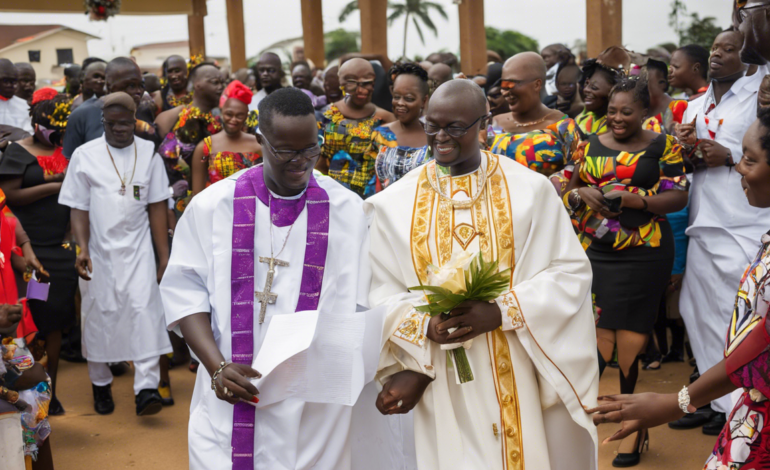
Guide to Ghana Priest Marriage Traditions
Introduction
Ghanaian culture is rich with diverse traditions, including those surrounding marriage ceremonies. Marriage is not only a union between two individuals but a melding of families and communities. Traditional beliefs and customs play a significant role in Ghanaian marriages, particularly for priests and individuals in religious vocations. In this guide, we will delve into the priest marriage traditions in Ghana, exploring the customs, rituals, and significance that make these ceremonies unique and profound.
Understanding Priest Marriage in Ghana
In Ghana, priests are highly respected figures within their communities. When a priest decides to get married, it is not just a personal decision but a communal celebration. The priest’s marriage is often seen as a symbol of unity, love, and continuity within the community. It is a time for joyous celebration and the reinforcement of cultural and religious values.
Types of Priest Marriages
In Ghana, there are different types of priest marriages, each with its unique customs and traditions. The most common types include:
-
Traditional Priest Marriages: These marriages follow the traditional customs and practices of the particular ethnic group to which the priest belongs. They often involve elaborate ceremonies, rituals, and festivities that reflect the cultural heritage of the community.
-
Christian Priest Marriages: For priests who are part of the Christian faith, their marriages may involve a combination of traditional Ghanaian customs and Christian religious rites. These ceremonies are often officiated by a fellow priest or pastor.
-
Islamic Priest Marriages: In cases where the priest is a member of the Islamic faith, the marriage ceremony will adhere to Islamic customs and traditions. Islamic marriages in Ghana are solemnized by an Imam and involve the recitation of prayers and readings from the Quran.
Rituals and Customs
Engagement Ceremony: Before the wedding, there is usually an engagement ceremony where the families of the bride and groom come together to formalize the union. This ceremony involves the exchange of gifts, including clothing, jewelry, and symbolic items that represent the union of the couple.
Dowry Payment: In many Ghanaian cultures, the groom is expected to pay a dowry to the bride’s family as a sign of respect and appreciation. The dowry can vary in form, from cash to livestock or other valuable items.
Traditional Ceremonies: Depending on the priest’s ethnic group, there may be specific traditional rites and ceremonies that are performed during the wedding. These can include libation ceremonies, drumming and dancing, and the wearing of traditional attire.
Christian Rites: If the priest is Christian, the wedding ceremony may include familiar Christian rituals such as the exchange of vows, the giving of rings, and blessings from a pastor or fellow clergy member.
Islamic Rites: For Islamic priests, the marriage ceremony will involve Islamic rites such as the signing of the marriage contract (Nikah), the recitation of prayers, and the giving of a dowry (Mahr) to the bride.
Celebrations and Festivities
Ghanaian priest marriages are known for their vibrant celebrations and festivities. Food, music, and dance play a central role in these joyous occasions. Guests are treated to traditional dishes such as Jollof rice, fufu, and kelewele, accompanied by live music and dancing.
FAQs (Frequently Asked Questions)
1. Can a priest in Ghana get married?
Yes, priests in Ghana are allowed to get married, especially in certain Christian denominations. However, the rules regarding marriage may vary depending on the specific religious institution.
2. How long do Ghanaian priest marriages typically last?
Ghanaian priest marriages, like any other marriage, vary in duration depending on the couple. The commitment to marriage is expected to be lifelong, but divorce is recognized under Ghanaian law in certain circumstances.
3. What role do families play in Ghanaian priest marriages?
Families play a significant role in Ghanaian priest marriages, from the negotiation of the dowry to the planning and execution of the wedding ceremonies. Families are involved in every step of the marriage process.
4. Are priest marriages in Ghana legally recognized?
Yes, priest marriages in Ghana are legally recognized if they adhere to the requirements of the Marriage Act of Ghana. Couples must register their marriage with the appropriate authorities to ensure legal recognition.
5. What are some common traditions at Ghanaian priest weddings?
Common traditions at Ghanaian priest weddings include the pouring of libations, the wearing of traditional attire, the exchange of gifts, and lively music and dancing. These traditions vary depending on the ethnic group and religious affiliation of the couple.
6. How are priest marriages in Ghana different from non-priest marriages?
Priest marriages in Ghana often involve a combination of traditional customs and religious rites specific to the priest’s faith. They may also carry a greater cultural and communal significance due to the priest’s respected position within the community.
Conclusion
Ghanaian priest marriages are a beautiful blend of tradition, culture, and spirituality. These ceremonies are not just about the union of two individuals but the joining of families, communities, and beliefs. By understanding the customs, rituals, and significance of priest marriages in Ghana, we gain insight into the depth and richness of Ghanaian culture.

